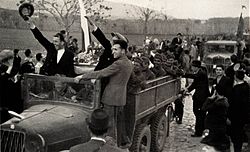
The Internal Macedonian Revolutionary Organization, was a secret revolutionary society founded in the Ottoman territories in Europe, that operated in the late 19th and early 20th centuries.
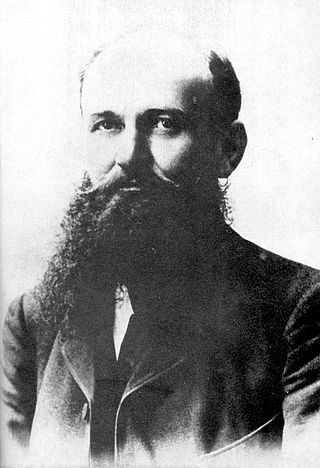
Gyorche Petrov Nikolov born Georgi Petrov Nikolov, was a Bulgarian teacher and revolutionary, one of the leaders of the Internal Macedonian Revolutionary Organization (IMRO). He was their representative in Sofia, the capital of Principality of Bulgaria. As such he was also a member of the Supreme Macedonian-Adrianople Committee (SMAC), participating in the work of its governing body. During the Balkan Wars, Petrov was a Bulgarian army volunteer, and during the First World War, he was involved in the activity of the Bulgarian occupation authorities in Serbia and Greece. Subsequently, he participated in Bulgarian politics, but was eventually killed by the rivaling IMARO right-wing faction. According to the Macedonian historiography, he was an ethnic Macedonian.

Todor Aleksandrov Poporushov, best known as Todor Alexandrov, also spelt as Alexandroff, was a Bulgarian revolutionary, army officer, politician and teacher, who fought for the freedom of Macedonia as a second Bulgarian state on the Balkans. He was a member of the Internal Macedonian-Adrianople Revolutionary Organisation (IMARO) and later of the Central Committee of the Internal Macedonian Revolutionary Organisation (IMRO).
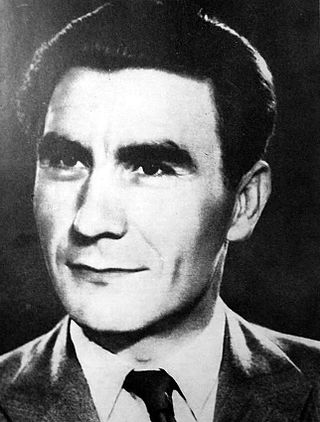
Lazar Koliševski was a Macedonian Yugoslav communist political leader in the Socialist Republic of Macedonia and briefly in the Socialist Federal Republic of Yugoslavia. He was closely allied with Josip Broz Tito.

Kole Nedelkovski was a Macedonian revolutionary and poet, and member of the Bulgarian Communist Party. He was a member of the Macedonian Literary Circle and he published two poetry books. Today, Nedelkovski is seen as one of the founders of the modern Macedonian poetry.
The Anti-fascist Assembly for the National Liberation of Macedonia was the supreme legislative and executive people's representative body of the communist Macedonian state from August 1944 until the end of World War II. The body was set up by the Macedonian Partisans during the final stages of the World War II in Yugoslav Macedonia. That occurred clandestinely in August 1944, in the Bulgarian occupation zone of Yugoslavia. Simultaneously another state was declared by pro-Nazi Germany Macedonian right-wing nationalists.
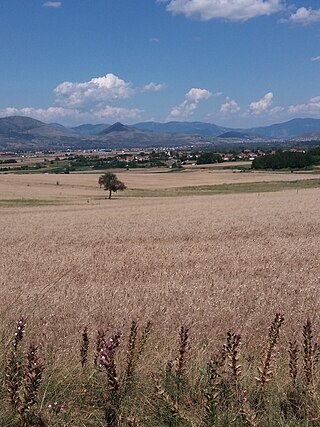
Kalochori (Greek: Καλοχώρι, before 1926: Δοβρόλιτσα - Dovrolitsa; Macedonian Slavic: Добролишта, Bulgarian: Добролища, Добролишча in the Kostur dialect, is a small rural village, part of the municipal unit of Kastoria, Kastoria regional unit, Greece. Kalochori is also located 14 kilometers away from the city of Kastoria and 14 kilometers away from the village of Nestorio. It was a part of the former municipal unit of Mesopotamia. The village has an elevation of 721 meters above sea level.
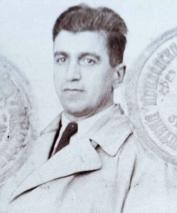
Metodi Tasev Shatorov - Sharlo was a Bulgarian Communist Party activist and also the temporary leader of the Regional Committee of Communists in Macedonia in 1940-1941. Like most left-wing politicians from Macedonia, during the 1930s he adopted the Resolution of the Comintern on the Macedonian question, about the recognition of a distinct Macedonian national identity. However, such Macedonian communist functionaries, originating from the Bulgarian Communist Party (BCP) and Internal Macedonian Revolutionary Organization (United), maintained pro-Bulgarian sentiments.

Andon Kalchev was a Bulgarian army officer, one of the leaders of the Bulgarian-backed Ohrana, a paramilitary formation of Bulgarians in Greek Macedonia during World War II Axis occupation. He was active outside the Bulgarian occupied area of Macedonia, under the tolerance of the Italian and German authorities which used him in their fights with rival Greek EAM-ELAS and Yugoslav Communist resistance groups. Because of his collaborationist activity, he was sentenced to death by Greek military tribunal, and was executed by firing squad on 27 August 1948.
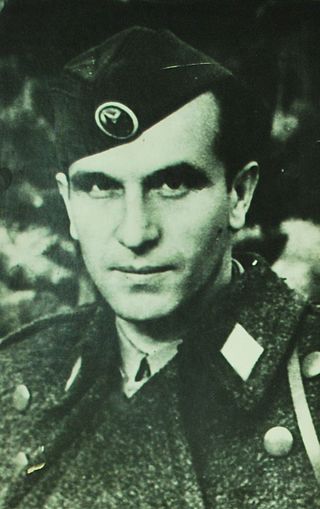
Mihailo Apostolski was a Macedonian general, partisan, military theoretician, politician, academic and historian. He was the commander of the General Staff of the National Liberation Army and Partisan Detachments of Macedonia, colonel general of the Yugoslav National Army, and was declared a People's Hero of Yugoslavia.

Ohrana were armed collaborationist detachments organized by the former Internal Macedonian Revolutionary Organization (IMRO) structures, composed of Bulgarians in Nazi-occupied Greek Macedonia during World War II and led by officers of the Bulgarian Army. Bulgaria was interested in acquiring Thessalonica and Western Macedonia, under Italian and German occupation and hoped to sway the allegiance of the 80,000 Slavs who lived there at the time. The appearance of Greek partisans in those areas persuaded the Axis to allow the formation of these collaborationst detachments. However, during late 1944, when the Axis appeared to be losing the war, many Bulgarian Nazi collaborators, Ohrana members and VMRO regiment volunteers fled to the opposite camp by joining the newly founded communist SNOF. The organization managed to recruit initially 1,000 up to 3,000 armed men from the Slavophone community that lived in the western part of Greek Macedonia.

World War II in Yugoslav Macedonia started with the Axis invasion of Yugoslavia in April 1941. Under the pressure of the Yugoslav Partisan movement, part of the Macedonian communists began in October 1941 a political and military campaign to resist the occupation of Vardar Macedonia. Officially, the area was called then Vardar Banovina, because the very name Macedonia was prohibited in the Kingdom of Yugoslavia. It was occupied mostly by Bulgarian, but also by German, Italian, and Albanian forces.
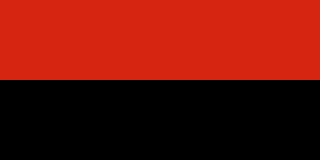
In September 1944, Nazi Germany briefly sought to establish an independent Macedonia, a puppet state in the territory of the Kingdom of Yugoslavia that had been occupied by the Kingdom of Bulgaria following the invasion of Yugoslavia in April 1941. When Soviet Union forces approached the borders of Bulgaria near the end of August 1944, Bulgaria declared neutrality and briefly sought to negotiate with the Western Allies. As the Bulgarian government was not impeding the withdrawal of German forces from Bulgaria or Romania, the Soviet Union treated it with suspicion. On 2 September, a new pro-Western government took power in Sofia, only to be replaced a week later by a pro-Soviet government after a Fatherland Front–led coup. However, on 5 September 1944, the Soviets declared war on Bulgaria.

Andon Lazov Yanev, nicknamed Kyoseto, was a Bulgarian revolutionary and a freedom fighter of the Internal Macedonian-Adrianople Revolutionary Organization (IMARO). Although he identified as Bulgarian, according to the historiography in North Macedonia, he was an ethnic Macedonian.
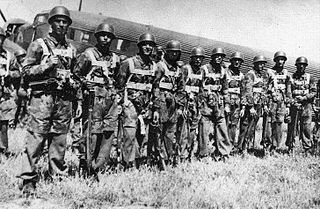
The Stracin–Kumanovo operation was an offensive operation conducted in 1944 by the Bulgarian Army against German forces in occupied Yugoslavia which culminated in the capture of Skopje in 1944. With the Bulgarian declaration of war on Germany on September 8, followed by Bulgarian withdrawal from the area, the German 1st Mountain Division moved north, occupied Skopje, and secured the strategic Belgrade–Nis–Salonika railroad line. On October 14, withdrawing from Greece, Army Group E faced Soviet and Bulgarian divisions advancing in Eastern Serbia and Vardar Macedonia; by November 2, the last German units left Northern Greece.
Spiro Kitinchev was a Macedonian Bulgarian writer, activist, and politician during the Second World War in Yugoslav Macedonia.

Day of the Macedonian Uprising is a public holiday in North Macedonia, commemorating what is considered there the beginning of the communist resistance against fascism during World War II in Yugoslav Macedonia, on October 11.
The Regional Committee of Communists in Macedonia was the provincial communist organization in Vardar Macedonia from 1939 to 1943.
Pande Sotirov Eftimov was a Bulgarian journalist, poet and publicist from Republic of Macedonia. Though, he is considered an ethnic Macedonian in today North Macedonia.

Rizo Rizov was a revolutionary from Veles and a participant in the Macedonian revolutionary movement. He was a member of the Internal Macedonian Adrianople Revolutionary Organization, fought for the independence of Macedonia and was one of the founders of the People's Federative Party and IMRO (United).
